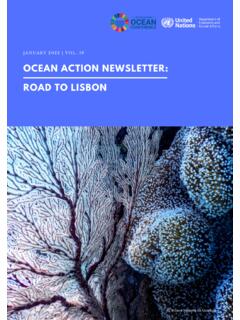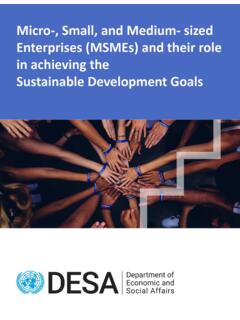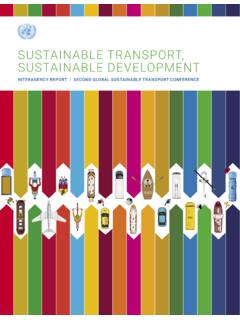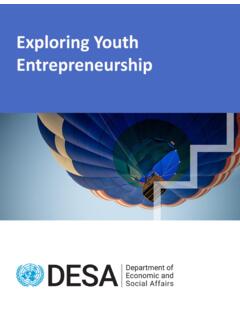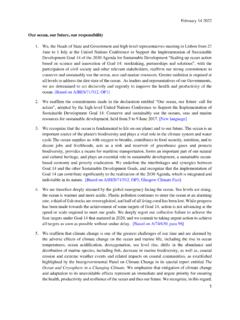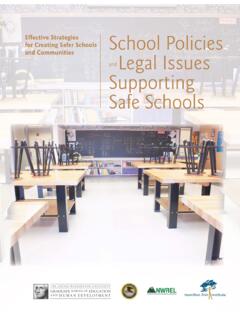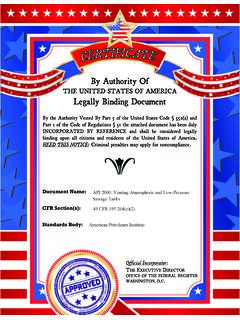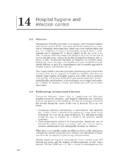Transcription of Summary Report - sdgs.un.org
1 12022 United Nations ECOSOC Partnership Forum Global Online Stakeholder ConsultationSummary ReportDecember 20212 This Summary Report was prepared based on inputs collected from stakeholders from several sectors by the Division of Sustainable Development Goals (DSDG) of the Department of Economic and Social Affairs (UNDESA). Drafting: Jordan Friedman and Lineke Wang Schrijver. Overall guidance: Lotta Tahtinen and Naiara Costa. Design and layout: Anastassiya KhvanCover photo: UN DESAC ontact DSDG on social mediaThe content of this Report serves only to provide a Summary of the inputs submitted by stakeholders from different sectors to the online consultation. The linked sites are not under the control of the United Nations, and the United Nations is not responsible for the con-tent of any linked site, or any link contained in a linked site.
2 The United Nations provides these links only as a convenience, and the inclusion of a link or reference does not imply the endorsement of the linked site by the United Global Online Consultation Outcomes Online Consultation QuestionsE-Consultation Summary Question 1 Question 2 Question 3 Question 4 Key Messages, Challenges and RecommendationsTable of Contents455788121919214 BackgroundThe United Nations 2022 ECOSOC Partnership Forum will be held on 2 February 2022 on the theme Building back better from the coronavirus disease (COVID -19) while advancing the full implementation of the 2030 Agenda for Sustainable Development . Multiple actors and stakeholders will participate, including coun-tries, the United Nations system, international financial institutions, international organizations, parliamentar-ians, local governments, non-governmental organiza-tions, the private sector, civil society, scientists, academ-ia, women, youth and will debate solutions and policies to over-come the COVID-19 pandemic guided by the SDGs.
3 They are expected to (a) exchange new ideas, expec-tations and priorities which should be explored further by the Council and the high-level political forum in the following months; and (b) shine the spotlight on for-ward-looking actions and partnerships by countries and all relevant stakeholders that can help recover from the pandemic and accelerate progress towards the 2030 Partnership Forum will be held back-to-back with the Council s new Coordination Segment that guides and coordinates the work of the UN and ECOSOC system, as decided by the General Assembly (A/RES/75/290A).To prepare for the Partnership Forum, a global online stakeholder consultation was set up to solicit views, ex-periences and proposals from all stakeholders and make them widely available in advance of the 2022 ECOSOC Partnership Forum.
4 This Report presents the main outcomes of the Global Online Stakeholder Consultation for The United Nations 2022 ECOSOC Partnership Forum. The global online consultation was open for inputs from all stakeholders. Many submissions were received, and although this re-port does not reflect all inputs, this Summary intends to reflect the main contributions present throughout mul-tiple submissions, by outlining views and suggestions from stakeholders. 5 UNDESA, through its Division for Sustainable Development Goals (DSDG), organized an online con-sultation to compile views, experiences and proposals from all stakeholders for the 2022 ECOSOC Partnership Forum. The online consultation was convened between 16 November and 3 December 2021 to support the mobilization and outreach of stakeholders at multiple levels and from different sectors to col-laborate on discussions for the next ECOSOC cycle.
5 Information about the global consultation was broadly disseminated through mailing lists, UN official websites and social media consultation was held through an open, online form. The form intended to collect inputs from non-governmental organizations, civil society organizations, academic institutions, the scientific community, the private sector, philanthropic organizations, major groups and other stakeholders as contributions to the preparatory process for the 2022 ECOSOC Partnership Forum. A limited num-ber of questions were proposed, and stakeholders were invited to contribute concise and straight-forward inputs. All inputs are made publicly available here. OutcomesA total of 265 inputs were received from stakeholders from all six regions of the world, with the fol-lowing distribution: Africa - 34%, Europe - 23%, North America - 19%, Asia and Pacific - 15%, Latin America and the Caribbean -5% and West Asia - 4%.
6 Of the 265 received inputs, 247 submissions contained substantive elements analyzed in this re-port. Stakeholders from 56 countries submitted contributions: Algeria, Argentina, Australia, Bahamas, Bangladesh, Belgium, Benin, Bolivia, Brazil, Cameroon, Canada, Central African Republic, China, Congo, Cote d Ivoire, Egypt, Fiji, France, Germany, Ghana, India, Indonesia, Iran, Iraq, Italy, Japan, Kenya, Liberia, Malaysia, Mali, Mauritania, Mexico, Moldova, the Netherlands, Niger, Nigeria, the Philippines, Portugal, Russia, Saudi Arabia, Senegal, Sierra Leone, South Africa, South Sudan, Spain, Sweden, Switzerland, Tanzania, Togo, Trinidad & Tobago, Tunisia, Uganda, the United King-dom, the United States, Vietnam and Yemen.
7 The majority of stakeholders contributing to the online consultation self-identified as represent-ing Non-Governmental Organizations ( ). Other sectors contributing inputs include: Ed-ucation & Academic Entities ( ); Women Organizations ( ); Children & Youth ( ); Persons with Disabilities ( ); Science & Technological Community ( ); Business & In-dustry ( ); Indigenous Peoples ( ); Workers & Trade Unions ( ); local Govern-ments ( ); and other stakeholders active in areas related to sustainable development (9%).All inputs submitted by stakeholders are publicly available and can be consulted at this website: Global Online Stakeholder Consultation6 Figure 2: Geographic distribution of submissionsFigure 3: Distribution of submissions per sector Figure 1: Distribution of submissions per region7 Online Consultation - QuestionsThe following questions were asked in the online consultation survey: Global Online Stakeholder Consultation Questions 1.
8 What do you consider to be the main priorities related to building back better from the COVID-19 pandemic while advancing the full implementation of the 2030 Agenda that should be discussed at the ECOSOC and the United Nations High Level Political Forum (HLPF)? Please, also provide the rationale for your proposal. 2. What type of policies would be required to achieve these priorities and what guidance could the ECOSOC and its subsidiary machinery, including the func-tional commissions, offer?3. Are you aware of any forward-looking action and/or innovative partnerships by Governments and stakeholders that are making an impact on the SDG on the ground and that could be featured at the ECOSOC Partnership Forum? Please, indicate the name, country and objectives of the initiative.
9 If possible, please, indicate contact focal Would you have suggestions on new or expanded actions, commitments or partnerships that could be initiated at the Partnership Forum and launched or further detailed at the HLPF and ECOSOC?Stakeholders were also asked to submit any suggestions for speakers at the 2022 ECOSOC Partner-ship forum. Of the 265 received submissions, 160 inputs included recommended speakers. UN DESA will be considering the recommendations as plans for the 2022 ECOSOC Partnership Forum are What do you consider to be the main priorities related to building back better from the COVID-19 pandemic while advancing the full implementation of the 2030 Agenda that should be discussed at the ECOSOC and the United Nations High Level Political Forum (HLPF)?
10 Figure 4: Reflection of linkage to most relevant SDGs based on inputs of Question 1 (created by LinkedSDGs)Figure 5: Word Cloud based on inputs of Question 1 (created by LinkedSDGs)E-Consultation SummaryThe following sections will bring a Summary of the main messages from the online consultation. The Summary is categorized into four sections to reflect the most relevant inputs to the four ques-tions. A few examples of practices shared in the online consultation are also reflected in boxes. In this first question, stakeholders were asked to state the main priorities that should be discussed at the 2022 ECOSOC Partnership Forum and the United Nations High Level Political Forum (HLPF). Stakeholders called for the 2022 ECOSOC Partnership Forum to prioritize health, education, pov-erty reduction and participatory engagement by youth and women.
